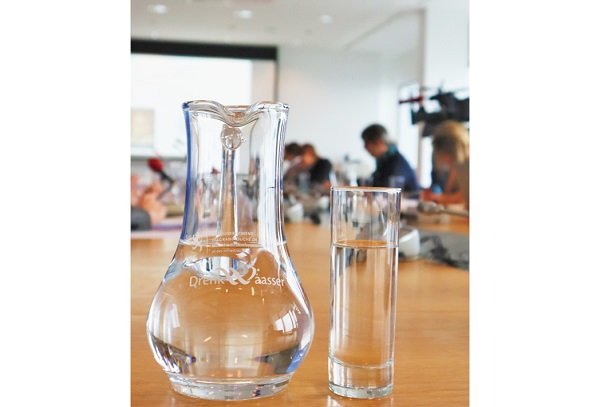 Credit: MECDD
Credit: MECDD
Luxembourg's Minister of the Environment, Climate and Sustainable Development, Joëlle Welfring, the Water Management Authority, the Syvicol union for Luxembourg cities and municipalities and the Luxembourg association of water services, Aluseau, recently presented the new drinking water law to members of the press.
Minister Welfring began by explaining the historical context of the drinking water law and its general structure. Tom Schaul, adviser to the Ministry of the Environment, then presented the law in more detail, whilst Syvicol President Emile Eicher emphasised the role and particular responsibility of municipalities in the provision of drinking water. Georges Kraus, Aluseau President, later shared this opinion and recalled the important role of Aluseau in facilitating the implementation and technical understanding of the drinking water law among municipalities.
The (now modified) water law of 2008 stipulates that municipalities are responsible for the distribution of drinking water. The privatisation of drinking water is therefore prohibited by Luxembourg law. In this regard, Syvicol has committed itself to greater collaboration between the municipalities and the municipal unions.
Luxembourg's drinking water is composed of half groundwater and half surface water (Upper Sûre Lake). Regular drinking water consumption has doubled in Luxembourg over the past fifteen years. Drinking water is therefore increasingly considered as a local and reliable food.
In order to guarantee the security of the supply of drinking water, the government has introduced a strategy to ensure the supply of drinking water in the long term. This strategy is based on three interconnected pillars: the protection of existing resources; the water economy; the exploitation of new resources.
According to the authorities, the growing interest in drinking water is translated not only by an increase in consumption, but also by the success of the "Right2Water" initiative, which collected approximately 1.8 million signatures in 2013. Among other things, this initiative aims to improve access to drinking water for all. Due to the success of this initiative, the European Commission decided to revise the Drinking Water Directive of 1998. The objective of this new directive is to improve the quality of drinking water and access to it. The revised version of this directive must be implemented in the entire European Union (EU) by 12 January 2023. In Luxembourg, the new law came into effect on 1 January 2023.
The new law replaces the Grand-Ducal regulation of 7 October 2002, which until now regulated the quality of drinking water. A large number of points in this regulation, such as the parameters that define the quality of drinking water, remain in place. Revisions include updated quality standards, the adoption of a risk-based approach, the regulation of materials in contact with water, improved access to water, improved public information and a sanctions regime.
"I am extremely proud to be able to say that we are taking a pioneering role in Luxembourg, because we have already implemented many measures that the European directive only provided for in the coming years," stated Minister Welfring.
The European directive provides for a certain number of delays. Luxembourg, however, has set itself the priority of achieving these objectives as quickly as possible, having already implemented risk management in drinking water zones and supply zones (Water Safety Plan).








